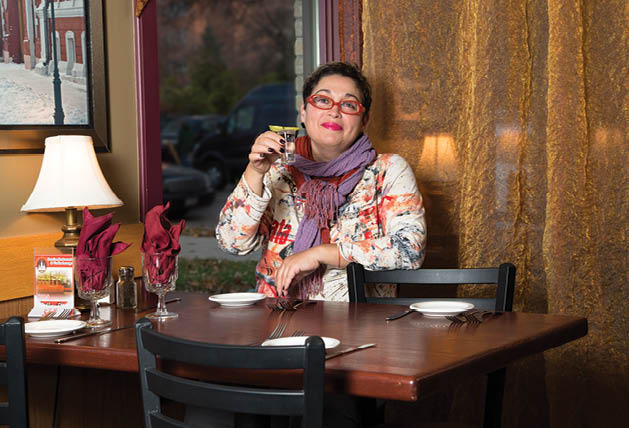Marina Liberman, who owns Moscow on the Hill with her husband, Naum, vividly remembers the hectic period 21 years ago following their purchase of what was then Quail on the Hill on Selby Avenue. Having moved from Moscow just three years before, not only were they struggling with the demands of running a restaurant, they were challenged by a new language and unfamiliar systems in a new country.
“People were leaving messages on the answering machine for us. I couldn’t understand what they were saying and couldn’t understand the numbers,” Marina Liberman says, candidly calling that first year “horrible” and recalling that the first time they walked into the restaurant, they didn’t know how to turn on the lights.
What the couple did know was that they were eager to build a new life in Minnesota with their young sons, Eugene, then 8 years old, and Igor, who was 18 months old. Both Marina and Naum were doctors in Russia and didn’t intend to go into the restaurant business. “The restaurant was available when we were looking, so that’s what we chose,” she says. “We were [looking for] any small business.”
The couple kept the name Quail on the Hill and its status as a French restaurant for the first two years, although Liberman says most of the guests didn’t realize the new owners were Russian and not French.
“At the time, a lot of people couldn’t tell the difference between a French accent and a Russian accent,” she says with a smile. “I had a customer tell me, ‘My grandmother just returned from France and she will be happy to hear a French accent,’ ” Liberman shrugs. “I had people ask me to read menu items in French.”
Finally, the couple transformed Quail on the Hill into Moscow on the Hill. Happy to share the food of their native land, they soon discovered what they were cooking at home now had to be done on a much larger scale.
“We serve classical Russian dishes for the local taste,” she says, adding that the restaurant’s most popular item, winter or summer, is beef stroganoff ($23.50). “Stroganoff is not the dish, but the creamy sauce. It is named for the Russian chef who created it. So there is such a thing as chicken stroganoff, even fish stroganoff,” Liberman says. “Many people are surprised that our beef stroganoff is not served over noodles, but over mashed potatoes. That is how it’s served in Russia.”
Another popular item at Moscow on the Hill is the Siberian pelmeni, which Liberman describes as a dumpling that is stuffed with meat or with potatoes and onion ($18.95 for a full order, $11 for a half-order). The restaurant also offers made-from-scratch chicken Kiev ($19.95) and, of course, borscht, served hot in the winter and cold in the summer (bowl $5.95, cup $3.95).
At first glance, these and other menu options seem to be traditionally Russian, but Liberman says many customers who are accustomed to Polish and German cooking in their families find much that’s familiar on the menu. “In Eastern Europe, the three main foods are potatoes, cabbage and meat, but they are just served in different ways,” she says.
A story on Moscow on the Hill wouldn’t be complete without mentioning their claim as “the biggest vodka bar in the Midwest,” according to Marina Liberman. It’s hard to imagine a larger one—they carry 400 kinds of vodka, including 12 specially infused vodkas created by Naum, with flavors such as cherry, pepper and tiramisu. Son Eugene, who is now the restaurant’s general manager, has also partnered with the 45th Parallel Distillery in New Richmond, Wis., to create Referent Vodka, which is all natural and infused with horseradish. It’s available at Moscow on the Hill as well as in several restaurants, bars and liquor stores in Minnesota, Wisconsin and Georgia.
“Vodka is our pride and our problem in Russia,” Marina Liberman admits. “But Russia and vodka have lived together for centuries.” While Russians tend to drink their vodka straight, Moscow on the Hill serves vodka in a variety of cocktails, including a popular vodka martini.
As Moscow on the Hill’s reputation as a destination restaurant has grown, the Libermans have made changes to both the comfortable interior, with an elegant European feel, but also to their expansive yet secluded patio (complete with wool blankets for chilly evenings during patio season). Near the front of the restaurant, there are now several leather chairs, complete with richly colored pillows, adding a more casual, lounge vibe. “It is nice to see people here talking and laughing,” Liberman says. Russian music of all varieties wafts through a speaker system; on Friday and Saturday nights, live accordion music is featured.
The two dining rooms are resplendent with artwork and photos from Russia, including a shelf of matryoshka (nesting dolls). Brocaded sheer gold curtains separate the tables in the larger room, which can also be reserved for private parties.
For the Liberman family, Minnesota is now home and they are happy living here. “Minnesota people are so nice,” says Marina Liberman, adding that she enjoys getting to know their regular customers and helping them mark special occasions or just enjoy a meal.
And while Marina’s English is now flawless (she learned it as an ESL student at St. Paul College), she, Naum and Eugene easily slip into Russian with each other, which she says always seems to intrigue their guests.
“They enjoy when we speak Russian to each other. They often ask if we are talking about them,” Marina says with a laugh. “ ‘Oh yes, we are talking about you, of course,’ ” she says, in a mock response, quickly adding, “No, we aren’t,” and laughs again.

(Marina Liberman, co-owner of Moswcow on the Hill; Photo by Joel Schnell)









